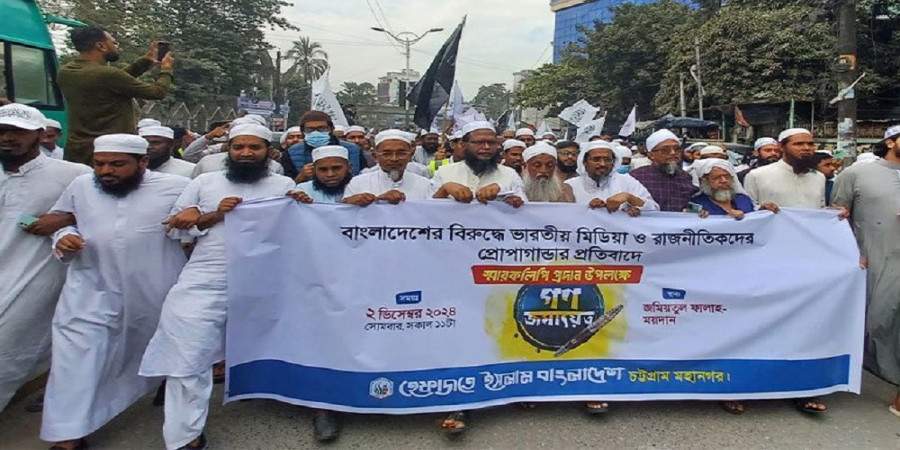
ছবি: Photo: Collected
Hefazat-e-Islam Bangladesh's Joint General Secretary, Mufti Harun Izhar, has called for an end to the spread of false information by Indian media regarding the treatment of minorities in Bangladesh. Speaking at a public rally held at the Jamiyatul Falah National Mosque premises in Chittagong on December 2, he accused Indian media of being involved in a propaganda campaign against Bangladesh. He emphasized that while Bangladesh values its relationship with neighboring countries, it will not tolerate any form of dominance or interference.
The rally, organized by Hefazat-e-Islam’s Chittagong Metropolitan Committee, was a protest against the anti-Bangladesh propaganda being spread by Indian media and politicians. Initially, the group had planned a march towards the Indian Assistant High Commission in Chittagong and a submission of a memorandum. However, due to a change in the schedule, the rally was held instead. The participants, including Hefazat-e-Islam members and supporters, later marched through various streets of the city and reached the Chittagong District Commissioner’s office to submit their memorandum.
The memorandum contained four key demands, which the group outlined as part of their ongoing protest. During his speech, Mufti Harun Izhar addressed the interim government, stating that Bangladesh must assert its sovereignty and confront India’s hegemonic tendencies. He pointed out that countries such as the Maldives, Nepal, and Sri Lanka had successfully broken free from India’s influence, while Bangladesh should do the same, without necessarily pursuing ties with Pakistan.
He continued to accuse the Indian government of undermining Bangladesh’s independence, asserting that the country’s current political and social problems were fueled by Indian interference. He also expressed concerns about the rise of the "ISKCON" terrorist group, which, according to him, is being supported by Indian fascist forces to stir up communal violence in Bangladesh. He alleged that Indian-backed forces were attempting to destabilize the country by exploiting religious differences.
In his speech, Harun Izhar also condemned the killing of lawyer Alif, blaming the ISKCON group for the assassination and calling for the organization to be banned in Bangladesh. He warned that the Bangladeshis were growing increasingly vocal in their opposition to India’s attempts to impose its will on the country. He declared that any attempt to impose authoritarianism, particularly through groups like ISKCON, would be rejected by the people of Bangladesh.
The memorandum, which was submitted to the Indian Assistant High Commissioner through the District Commissioner’s office, made several demands, including the cessation of false reporting by the media, responsible political conduct, and an end to foreign interference, particularly by Indian intelligence agencies. The document emphasized the importance of maintaining smooth bilateral relations between Bangladesh and India, based on mutual respect and non-interference in each other's internal matters.
The Hefazat-e-Islam leaders assured India that Bangladesh does not harbor any animosity towards the country or its people. The group reiterated that their protests were not against India, but against the false portrayal of events within Bangladesh by certain media outlets. They emphasized that Bangladesh was committed to preserving its sovereignty and maintaining peaceful relations with all neighboring countries, including India.
The memorandum also called for swift action from the Indian government to stop the spread of false information that could jeopardize the long-standing friendship between the two nations. The leaders expressed their belief that India, as a progressive nation, would take the necessary steps to curb the harmful effects of misinformation.
The rally saw speeches from several key leaders, including Maulana Ayub Babungari, the Deputy Amir of Hefazat-e-Islam Bangladesh, and Maulana Mir Idris, the joint secretary of the organization. Maulana Habibullah Azadi, Maulana Zafar Ahmed Bhatuya, and other prominent leaders also addressed the crowd. Maulana Nasir Uddin Munir, another leader, called for the arrest of the individuals responsible for the murder of lawyer Alif, adding that the name Chinmoy Krishna Das should be included in the investigation.
In conclusion, the Hefazat-e-Islam leaders made it clear that their protests were focused on protecting Bangladesh's independence and dignity, rejecting any attempts by external forces, including India, to interfere in the country’s internal affairs. They vowed to continue their struggle against Indian hegemony and communal violence, stressing that the people of Bangladesh would not allow their sovereignty to be undermined.
repoter






